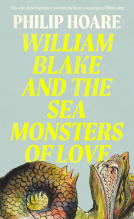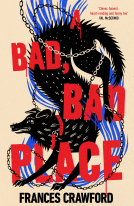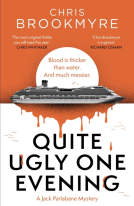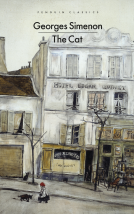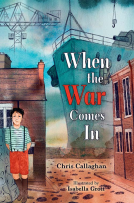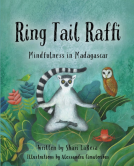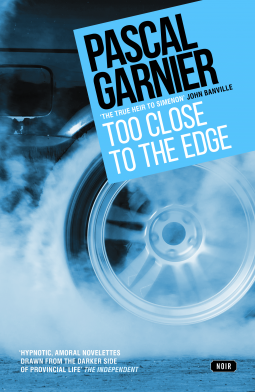
Too Close to the Edge: Shocking, hilarious and poignant noir
by Pascal Garnier
This title was previously available on NetGalley and is now archived.
Send NetGalley books directly to your Kindle or Kindle app
1
To read on a Kindle or Kindle app, please add kindle@netgalley.com as an approved email address to receive files in your Amazon account. Click here for step-by-step instructions.
2
Also find your Kindle email address within your Amazon account, and enter it here.
Pub Date 14 Jun 2016 | Archive Date 23 Jun 2016
Description
Recently widowed grandmother Éliette is returning to her house in the mountains when her car breaks down. A stranger offers help and Éliette gives him a lift, glad of the company and interruption to her routine.
A tale of retirement and calm domesticity, with a hint of menace about to explode.
A Note From the Publisher
$13.95 USD
Advance Praise
'A mixture of Albert Camus and JG Ballard' Financial Times
‘Bleak, often funny and never predictable’ The Observer
'A brilliant exercise in grim and gripping irony, it makes you grin as well as wince.' Sunday Telegraph
Available Editions
| EDITION | Other Format |
| ISBN | 9781910477250 |
| PRICE | $14.95 (USD) |
Average rating from 25 members
Featured Reviews
 Educator 211653
Educator 211653
Thank you Net Galley, for this book and for introducing me to his work. I read my first book by Mr. Garnier courtesy Net Galley and always request any of his works that are on offer. This book is beautiful just like the rest. A tight "mystery" that keeps you hooked to the end.
 Reviewer 88339
Reviewer 88339
With each turn of the page the story becomes darker and darker. Éliette certainly blossoms from mild mannered mature woman to a stealth bad girl before our very eyes. Her quiet, lonesome life dives headfirst into sheer mayhem. Lots of humor peppering the narrative with precision timing. Secondary characters along with subplots enhance the foreboding impending events. Another prize from Garnier. The ending was fantastic. Once again translation is excellent, kudos to Emily Boyce.
 Sue B, Reviewer
Sue B, Reviewer
I'm a huge fan of Garnier's work and this latest book to be published by Gallic Books doesn't disappoint. As dark as usual, the sense of foreboding builds up relentlessly and, with a few plot twists along the way, makes for a really enjoyable read.
 Chris M, Reviewer
Chris M, Reviewer
I received a copy of this book from the publisher through NetGalley in exchange for an honest review.
This is the second book that I have read by Mr. Garnier and I am confident that I will be reading the rest of his work. These short, intense mysteries would appeal to anyone who enjoys great Noir fiction and the added bonus of the cultural nuances from the settings being placed in France just makes these books that much more interesting to me.
The Islanders was darker and more humorous. Close to the Edge is brilliantly plotted and tragic but maintains an overall quirky and ironic feel that I found to be original and intriguing. The books are quite different in tone, yet they are both compelling and riveting. A reader starting one of his books on a train would most likely wish for a longer ride because one you start one of Garnier’s stories, you will want to read straight through to the end.
Other reviewers have compared Garnier to other French writers and I have to confess ignorance of those other writers (that I plan on remedying to be sure). For me, I was reminded of the brilliance of James M. Cain. There is in both of these masters a tense reality in the characters and an urgency to the rapidly moving storyline that few authors can accomplish. Additionally, both authors strip their stories down to the bare bones so that the reader is engaged from the first page and won’t take a breath until the final, perhaps unexpected, conclusion. Garnier’s books are the perfect length for the stories they tell and that is another part of their charm.
Five stars. Noir doesn’t get any better.
I will be reading the rest of Garnier’s work, most of them in one sitting.
 Carol P, Reviewer
Carol P, Reviewer
Eliette retired into the county even though her children were against her being on her own after the death of her husband but she lives a quiet life, that is until she doesn't. One day she breaks down and a stranger helps her, he says he has broken down and she gives him a lift. Eliette seems to throw caution to the wind and the subtle plot gets darker as it goes along. I loved it and will definately be looking out for Pascal Garnier again.
 Douglas O, Reviewer
Douglas O, Reviewer
I have become a huge fan of Pascal Garnier. I love the way the stories flow from gentle beginnings to intense finishes. They make for compulsive reading. This story is particularly good. It goes from retired tranquility to consuming crime. The characters are well drawn and the story is full of surprises. Credit must be given to the translator too. The story in English flows beautifully and that is down to effective and sensitive translation.
 emma c, Reviewer
emma c, Reviewer
VERDICT: The great author of French noir bluntly looks at the seemingly quiet life of a senior. Opening your door may lead you to unexpected ominous horizons and possibly to revealing a new you dormant behind a façade all these years.
Pascal Garnier has the knack for starting his story with a common situation in the life of common people and turning it into a nightmare and descent into hell. His formula worked again for me in Too Close to the Edge.
Charles and Éliette lived an untarnished love for forty years. Then he died, a couple of months before his retirement.
Éliette is now 64, she has two children and three grandchildren. She lives by herself near Montélimar, in the Ardèche region.
She’s content to a certain point: she loves her family, but does not want to see them too often. She gradually starts feeling disgusted by the way she let herself go and by her lack of sex life.
Her neighbors Paul and Rose Jauberts are working hard, too hard to her taste, to keep her busy. So she buys a “microcar” to get more independence and freedom.
One day, on her way from the supermarket, her car gets a flat. Out of nowhere appears a man in his 40s, in a three-piece suit. He helps her. He says his own car broke down, and there’s a horrible thunderstorm, so she invites him in her house. He accepts and makes himself more and more at home. In the meantime, Paul announces his son Patrick was just killed in a car accident.
Éliette is happy to have someone in her house, and she’ll be led to accept more strangers, with unexpected consequences that will totally transform her life.
Through Éliette’s character, Pascal Garnier tackles the theme of contentment with one’s life. Are you happy with your current life? Are you daring to open your door to novelty and risk? To what extent? Will you follow through when it leads you to new horizons and possibly to a new you?
This is connected with the theme of identity: is Éliette the woman with a common façade of “the good wife and mother, the dignified widow”, or is she someone very different inside, that will be only revealed when events push her to the edge?
And as in Moon in a Dead Eye, it is focused on seniors and what one may do during retirement years. Garnier manages to lead you little by little to dark and hopeless situations, all the more so that he deftly juxtaposes poetry with violence.
Some of his descriptions are grotesque and even gross.
He doesn’t hesitate either pushing the edge of the envelop (with incest, drugs, and alcohol, already central in The Islanders).
 John L, Reviewer
John L, Reviewer
Meet Pascal Garnier. Normally, in starting a review that way, I'm on about the main character of the book, but it could be said the biggest character of any Pascal Garnier book is Pascal Garnier, not that that's a flaw. Over a half-dozen titles I've come to know the pattern of his output, and it's fair to say this example fits it very well. Again, not a fault. His thrillers have a small cast list of characters, trapped somehow in a small community, cut off by weather, season or remoteness. Here we are with Eliette, and just a handful of others, and watching her as she celebrates the return of spring to her remote home, an ex-silk farm in southern France. All characters have a darkness about them, including Eliette – she had wanted to retire to the place with her loving, long-term husband, but he died of cancer months before retirement. And the final piece of the Garnier pattern is that that darkness, the black surrounding the night stars to use one of the more memorable lines here, is that things – said situation, other people, life itself – cause people to do some equally black and stupid acts…
But we're met with light and joy here, even if there's an awkwardness surrounding the woman's children turning up at Eliette's with their own broods for Whitsun (families are never completely nuclear in Garnier books, unless you refer to them being dangerously fissile). Eliette is taking stock, wondering what she is supposed to intend for herself in her isolated circumstances, with only two people as neighbours, a couple who have watched her and her family make ready the farm over decades of summer breaks. Luckily for her, a handsome and mysterious man turns up completely naturally, and she feels a stirring to match the spring time. Unfortunately for others, a death means the darkness of winter is only to the fore.
All told, however, I can't quite pin down why I didn't completely love this book, and that from a devoted Garnier reader. There has often been a sniff about him of his black comedy not quite working – I've enjoyed several of his taut, unflowery, bagginess-free novels for the situation they posit as well as the commentary they make on the blackness of (portions of) humanity, only to read around them and find they were supposed to be funny. I'm sure that's not the case here, although it has to be said that so many people do such stupid things in this instance that if you were to film it there would not be a straight face in the cinema. It's a bit OTT, and I am not convinced there is enough of a theme here, not quite the compelling and snappy statement regarding human nature, to let Garnier get away with the extreme.
That said, I've yet to meet a bad Garnier book. Once again he dresses his prose with no flourishes of style, favouring the blunt and matter-of-fact, but in a way that he does not dwell on evil actions or consequences and make the books hard to stomach, which they could well be given a different approach. This early work (his fourth of about sixteen adult novels, which he managed to fit in along with seven books of shorts and almost two score young readers, all in just 25 years of a truncated career) has all the galling inexorability of his regular works, which routinely defy the description 'regular'. Here you will not finish this without having met with at least one or two surprises, and the strongest, most pleasurable flavour in your mouth provided by the author's usual 'je ne sais quoi'.
 Wendy S, Reviewer
Wendy S, Reviewer
Close to the Edge was my first Pascal Garnier experience. Despite a stunted start, I soon settled into the clipped pace and style of writing. In fact, I can’t recall the last time I ever read a book so quickly.
Eliette has lost her beloved husband to cancer and she is a loss as to what to do with herself. Her grown up children have lives of their own and despite their casual nurturing and occasional watchful glances she has a light-bulb moment of how she wants her life to continue without their father.
Before his death, they had their sights set on a quiet little farmstead. So why not continue the dream? Despite the sadness, she realises she’s not the one who passed away. So, off she goes and along the way she’s developing new skills like driving, claiming a new image by wearing jeans, and she’s even encouraged to invite a helpful stranger into her home, after he kindly changed her tyre in the pouring rain.
Such an event would be unthinkable to her family. But she doesn’t let that hold her back, especially as life is proved to be undoubtedly fragile when another tragedy strikes, as she learns her neighbour's son has been killed in a car accident. Eliette sees her friends trudging through the fallout from the psychological damage caused by an unexpected incident and this gives her quiet determination room to grow.
After a series of horrendous events that conspire against this little group of people and their very personal reactions to the grief process in a quite extreme manner, Eliette finds she is more encouraged by her new found confidence. The enigmatic stranger has an alluring pull and she just can’t help herself, nor does she want to, as she wants to discover more about him and his life before he arrived on the scene. She might be sixty-four, but, after all, she is alive and her desire to step outside her usual 'motherly box' finds her dismissing her usual sensibilities.
It’s a diverse tale erring on a variety of darker 'domestic' themes: incest, murder, suicide, discrimination, alcoholism, and drugs. There's a lot crammed into the pages, yet somehow it’s not oppressive or disturbingly illicit.
It comes to the boil quickly and bubbles continually to keep the story moving forward. Like I say, it’s one of the quickest reads I’ve ever encountered. If you're interested in the study of people and their unpredictable reactions to monumental upheavals in their lives, then this is an especially fine example.
Tissue papering over the Abyss
Pascal Garnier’s Too Close To The Edge is so far away from being my usual kind of read that I can’t love it (quite shockingly violent) but it is such a wonderfully executed piece of terse, brutal, beautifully written, shocking crime fiction that I have to strongly recommend it to crime fiction lovers! And it is also very funny, though just as the reader is laughing at the savage humour the writer introduces shocks that had this reader feeling remarkably shaken.
“As in all the places where Napoleon had left a strand of hair, the Relais de L’Empereur was decorated with golden bees, wall hangings and furniture of uncertain age, and peopled with staff so practised at bending and scraping that an avant-garde choeographer would have applauded them”
Garnier also managed the balance of sometimes dreadful brutality, not pulling his punches – and yet at the same time, not indulging gratuitously and unrealistically, in the way lesser writers often do – too many shots, too many impossibly graphic wounds and still they keep fighting, Hollywood style. In some ways, Garnier’s blunt depictions of brutality were worse, because they seemed possible and accurate
I may not read another Garnier (though who can tell) but it is purely because I have too active an imagination and quite a sensitive stomach
Éliette is a still vital woman in her 60s. She and her husband moved to a rural retreat, following his retirement. Unfortunately, Charles died, fairly suddenly, through illness. She misses him; they had a good and passionate marriage, and she also misses touch, and sex. Her grown-up children have their own busy lives, live elsewhere, and arrogantly assume Éliette is past it
A chance encounter with a good Samaritan when she has a puncture on a lonely road leads her to invite Étienne, the similarly aged Samaritan, to her home. Éliette has been aware of her longing for sex, and she finds Étienne, who is quite mysterious, rather alluring
“In the vegetable aisle, she blushed as it dawned on her she had filled her trolley with courgettes, aubergines, carrots, cucumbers and even an enormous long white turnip weighing nearly 300 grams, which she struggled to make herself see in a culinary light. It was stronger than she was; a kind of inflammation of her mind was slowly turning the supermarket into a sex shop”
Then a tragedy befalls her nearest neighbours, another couple of similar age. One of their sons is tragically killed in a car crash.
And that is just the start of a rapid spiral out from the settled, safe, bland normality of Éliette’s life, and into an abyss of darkness, violence, and crime
What I really valued in Garnier was this uncovering of perfectly normal, law abiding people. Happenstance and coincidence bring unlikely events and personalities together, and the wheels of a safe and stable life suddenly find they have moved to the wrong side of the track, and the destination is not going to be ‘peacefully died in her sleep, mourned by her children and grandchildren’ as the total description of a long, uneventful, unexceptional life. That might have been the destination Éliette and her friends and family would imagine for her, so placid and unremarkable has her life been.
I received this as a digital review copy from Gallic Press, via NetGalley. Gallic are, or have been publishing many of Garnier’s titles, translated from the French by Emily Boyce. I didn’t find myself picking up on what seemed awkwardness, so can only assume Boyce’s translation captres the feel of Garnier’s language and style. It certainly feels smooth, in the way strictly literal word-for-word translations rarely do.
In his native France, Garnier, who died in 2010, was often compared to Georges Simenon. I found myself thinking of Patricia Highsmith, another very classy crime writer indeed. Garnier has an extra turn of the mordant humour before the killer punch screw, I feel
This is published on April 1st, Kindle and Paperback in the UK, and available to download on that date in the States, though paper copies will not be available till June 14th
 Mandy J, Reviewer
Mandy J, Reviewer
It all starts off so peacefully. Eliette has been recently widowed and decides to retire to the country home she and her husband had bought before his untimely death. Not quite the future that they’d planned, and certainly not what her children think is the right future for her, but for Eliette a quiet, isolated existence seems just the right way to cope with her grief. All seems to be going well until one day her car breaks down. A passing stranger comes to her aid, and at that point we enter Pascal Garnier’s trademark dark and menacing world. Short, expertly plotted, with a compelling narrative, Garnier has written yet another creepy and disturbing novel. A very good read.
 Neil C, Reviewer
Neil C, Reviewer
This is a short story with every thing from murder, drugs and incest included.
The story is a little far fetched but rolls along at a good pace and if your stomach can take it is worth a read.
This is a very well written tightly wound thriller and I loved it. Éliette is a widow who lost her husband to cancer. They always planned to retire to the country so despite his death she decides to move there. She is settling into a quiet life, reading, listening to music and cooking. One day she gets a flat on the road and a stranger stops by to help and nothing is the same. This is a dark story with lots of violence but it is also a quick short exciting read. I will be reading more by this author. Enjoy
 E V, Reviewer
E V, Reviewer
I just finished this book and I don’t know what to do with myself! I am breathless. Eliette Velard is contemplating her life. The 64 year old’s husband of 40 years has died and a year later she is still sorting things out. After selling off her flat in Boulogne, she moves to the rural home in Saint-Vincent where she and her husband once planned to live after retirement. Her life makes an abrupt change when she give a lift to the stranger that fixed her car’s flat tire. She takes him to her home while he waits to get a mechanic for his broken down car. Unexpectedly, her neighbor’s son is killed after hitting an abandoned car. Coincidence? No, this is Garnier; it is just beginning of that slippery slope of chaos into which Eliette throws herself headlong. Unpredictable, mind-boggling, Too Close to the Edge is non-stop absurdity. It is simply sublime.
Readers who liked this book also liked:
Philip Hoare
Arts & Photography, Biographies & Memoirs, Nonfiction (Adult)
Pirkko Saisio
Biographies & Memoirs, General Fiction (Adult), Literary Fiction
Carine Laforest;
Children's Fiction
